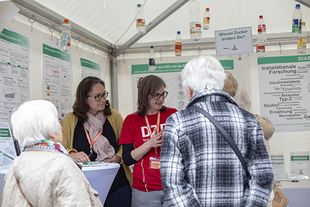DIfE took the tenth anniversary of the DZD as an opportunity to convey important information on the subject of diabetes through lectures and hands-on activities. Researchers from the Department of Experimental Diabetology, the Research Group Clinical Nutrition and the Junior Research Group Central Regulation of Metabolism answered the questions of the audience.
Intermittent fasting to protect against type 2 diabetes?
Professor Annette Schürmann, head of the Department of Experimental Diabetology at DIfE and DZD speaker, explained in her lecture which factors contribute to the development of diabetes, how the disease is prevented and how it is currently treated. The second part of her presentation dealt with the topic of intermittent fasting and its protective effect against type 2 diabetes. Conclusion: Intermittent fasting is a method to lose weight and improve insulin sensitivity that is compatible with everyday life, provided that actually fewer calories are consumed.
What types of diabetes are there?
Approximately 7.5 million people in Germany have type 1 or type 2 diabetes, and the number is rising. But what is behind these two types of diabetes? What are their characteristics and who suffers from each type of diabetes? By means of a diabetes puzzle, visitors to the DIfE pavilion in the research camp were able to visualize this. Even the youngest visitors were eager to put the ten puzzle pieces together.
How high is my risk for type 2 diabetes?
The visitors obtained the answer to this question quickly, easily, and without a blood draw by means of the DIfE – GERMAN DIABETES RISK SCORE®. They answered eleven questions about their eating habits, waist circumference and family medical history. After completion of the test, the individual risk of developing type 2 diabetes within the next five years was determined. If the risk score was high and outside the normal range, the diabetes researchers explained the most important risk factors that can be influenced by diet and lifestyle.
Sugary drinks – calorie bombs or thirst quenchers?
The daily consumption of soft drinks and other sweetened drinks contributes in the long term to a weight gain of one kilogram per year and thus increases the risk of type 2 diabetes. With sugar cubes in bottles, the DIfE team illustrated the sugar content of popular drinks such as apple spritzer, lemon-flavored soft drinks or seemingly harmless fruit-flavored water, which with its content of about 24 sugar cubes per 1.5 liter amazed the visitors. Additionally, awareness about the "liquid calories" was sharpened in a quiz.
Why do we often eat too much and why is it so difficult for us to lose weight?
Dr. André Kleinridders, head of the DIfE junior research group Central Regulation of Metabolism, went into more detail. In his lecture, he explained that energy homeostasis in healthy people is controlled by the brain and regulated by the intake of sugar and fat as well as the hormones insulin and leptin. Factors such as stress or specific food components can, however, disturb this balance and in the long term lead to an increased calorie intake and obesity with all its secondary diseases.
Background information:
DZD research at DIfE
DIfE has been conducting experimental and applied diabetes research within the DZD for ten years. In interdisciplinary cooperation, DIfE scientists identify and characterize genes and epigenetic changes that contribute to type 2 diabetes. They also optimize the DIfE - GERMAN DIABETES RISK SCORE® as a clinical type 2 diabetes screening tool, and participate in clinical trials to prevent diabetes and improve treatment. Further information at www.dife.de or www.dzd-ev.de.
The test to determine the DIfE – GERMAN DIABETES RISK SCORE® is available free of charge at drs.dife.de.

